Meet the Team
HIMC is comprised of a diverse team of immunologists, computational scientists and technical specialists. We work together to offer comprehensive immune monitoring solutions for a wide range of studies, including providing guidance in project development and clinical study/trial design, logistical support in study sample management, a host of cutting edge immunological assays and bioinformatics support to assist with the analysis and integration of complex immunological datasets.

Miriam Merad, MD, PhD
Dr. Merad, MD, PhD, is an expert in DC biology and has been studying the role of DCs in tissue for more than ten years. As Director of the Precision Immunology Institute at Mount Sinai and Professor of Oncological Sciences, Dr. Merad made key contributions to our understanding of the regulation of DC development and function and has identified the origin and functional diversity of the phagocyte pool in the intestine, with implications in cancer immunotherapy. Dr. Merad is also the Director of the Human Immune Monitoring Center at Mount Sinai School of Medicine (MSSM) which goal is to identify novel immune biomarkers of disease and response to therapy in patients with cancer, allergic disease, or viral infection. She is the recipient of numerous NIH awards for consortium-based efforts related to immune monitoring of vaccines, including in cancer, and for developing sample-sparing immune monitoring techniques. As part of the MS-CIMAC leadership team, Dr. Merad will be responsible for the design of the experiments planned for each trial, data review, and the overall coordination of the project design.

Seunghee Kim-Schulze, PhD
Dr. Seunghee Kim-Schulze, PhD, is a Professor of Immunology & Immunotherapy at the Icahn School of Medicine at Mount Sinai and the founding Facility Director of the Human Immune Monitoring Center (HIMC). A recognized leader in translational immunology and grantsmanship, Dr. Kim-Schulze has built HIMC into one of the largest and most comprehensive immune monitoring programs in the United States, supporting over 150 clinical trials across oncology, autoimmune, cardiovascular, and neuro-inflammatory diseases. Her research focuses on integrating multi-omics immune profiling to identify mechanistic biomarkers of therapy response and resistance. Under her direction, HIMC has expanded into a new 5,000-sq-ft facility dedicated to high-throughput immune monitoring and multi-platform data integration. Dr. Kim-Schulze also co-founded OCCAMimmune, an academic research organization (ARO) that leverages HIMC’s infrastructure to provide end-to-end immune monitoring, biomarker discovery, and data-driven translational support for the industry partners. Dr. Kim-Schulze serves as PI, co-PI, and Core Director on multiple NIH consortia and Cancer Center grants, contributing to national efforts in correlative immunology and precision medicine. She has authored or co-authored more than 200 peer-reviewed publications in leading journals in oncology, immunology, and translational medicine

Sacha Gnjatic, PhD
Dr. Sacha Gnjatic, PhD is a Professor and the Associate Director of the Human Immune Monitoring Center at the Icahn School of Medicine at Mount Sinai. Dr. Gnjatic’s lab focuses on human immune responses to cancer in an antigen-specific manner, in the periphery and at the tumor site, to define new targets for the development of cancer immunotherapies, how they work and why they may fail. Dr. Gnjatic’s work on tumor antigens has established the immunological basis for testing cancer vaccines in over 40 clinical trials, opening a new field of cancer immunology based on clinical discovery, with the goal to achieve protective integrated immune responses in the fight against cancer. Dr. Gnjatic’s laboratory has pioneered novel high-dimensional techniques and served as reference for harmonized immunomonitoring of humoral, cellular, and tissue-based immune correlates, which has led to the adoption of new standards by other labs.

Zhihong Chen, PhD
Zhihong (Z) Chen, PhD, serves as the Research and Development Director at the Human Immune Monitoring Center (HIMC), at Mount Sinai. Prior to joining HIMC, Dr. Chen dedicated 14 years of research centering around the functions of innate immunity in Central Nervous System (CNS) diseases, including traumatic brain injury and brain malignancies, with a focus on microglial/macrophage biology and neuropathology. Dr. Chen has played a significant role in various NIH or foundation-funded projects related to innate immunity-mediated neuro-modulations and brain cancer. Within the HIMC, Dr. Chen leads the scRNA-seq, spatial transcriptomics, and immune cell profiling divisions. Dr. Chen actively seeks out challenging problems and embraces innovation, and is extremely keen on implementing and exploring novel and cutting-edge technology platforms through the design, initiation, and optimization of state-of-the-art techniques, to contribute to the scientific communities in the most productive and efficient way possible.

Erik Wambre, Ph.D
Dr. Wambre the Director of Technology and Business Development at the Human Immune Monitoring Center (HIMC) at Mount Sinai. Prior to joining HIMC, Dr. Wambre has engaged in over 12 years of research focused on providing in-depth monitoring of immune responses in allergy, infectious diseases, autoimmune and cancer vaccine development, with the primary objectives to enhance our understanding of the pathogenesis, regulation and functions of the adaptive immune system in disease pathways, and delve into questions related to the correlation between clinical responses and immunological changes during immunotherapy. Dr. Wambre has identified a phenotypically and functionally distinct human TH2 cell subpopulation associated with allergic disorders that may represent an effective therapeutic target. As a co-Investigator on multiple NIH or NCI funded grants, he has successfully administered multi-year projects, resulting in peer-reviewed publications and presentations at national meetings from each project. In HIMC, Dr. Wambre will apply both established and novel techniques to track and profile global and antigen-specific immune responses from clinical samples, utilizing the techniques for translational and clinical applications include identification of biomarkers of clinical interest, and development of new therapeutic strategies.
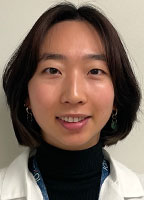
Rachel A. Chen
Rachel A. Chen received her bachelor’s degree from Binghamton University in 2021 double majoring in Biological Sciences and Environmental Studies: Ecosystems. During her undergraduate career, she was part of Dr. Molly Patterson’s lab, where she focused on the composition of Benthic Foraminifera communities in the Northwestern Pacific Ocean from the Mid-Late Pleistocene. In her senior year, she entered an accelerated master's Program, where she received her master’s in Ecology, Evolution, and Behavior. For her graduate studies, she studied how latitudinal gradients can create high niche opportunities and invasion success for short-distance range expanders in Dr. Kirsten Prior’s lab. She also began a DNA barcoding study on parasitoid wasps to identify cryptic speciation and to ultimately contribute to biological control efforts for an invasive insect. At the HIMC, Rachel assists in preparing libraries from RNA and operating the 10x single cell sequencing platform.
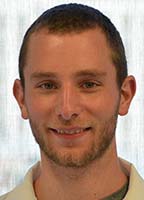
Geoffrey Kelly
Geoffrey Kelly received his bachelor’s degree in Biology from the University at Buffalo in 2015. Geoffrey joined the Faust Lab at Columbia University where he researched the underlying pathogenesis of Essential Tremor. He is interested in expanding his research skills and plans to enter a bioinformatics master’s program in the future.
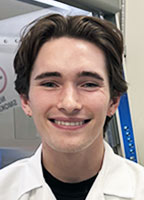
Joseph Martin
Joseph (JT) has a Bachelor's degree in Biology (Pre-Med focus) from Western Connecticut State University where he minored in chemistry and philosophy. At WCSU, he worked in Dr. Monette's lab where he conducted research on the biological mechanisms underlying Fundulus heteroclitus thermoplasticity. After graduating, JT worked in the Western Connecticut Tick Lab where he contributed to research on tick phenology, Borrelia burgdorferi ecology, and tick-human interaction. JT joined HIMC in January, 2025 where he is dedicated to biospecimen processing and sample management for various clinical studies, and downstream multiplex proteomics for cytokine, chemokine and soluble protein analysis. He is excited to learn to use HIMC's plethora of assays and contribute to advancements in translational immunology.
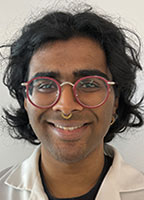
Sachin Matthew
Sachin has a Master’s in Computer Science from the University of Cambridge and a Bachelor’s in Electrical Engineering and Computer Science from Rutgers University. Sachin has engaged in a variety of research topics including dosage schedule optimization for cancer patients, real-time video tagging of flying pollinators, and hardware-optimized machine learning-based imaging using Tsetlin Machines. After their Master’s in the UK, they continued their research as an Associate Researcher within the Energy and Environment Group in Cambridge’s Department of Science and Technology. This project focused on deploying an array of parallel nodes for non-invasively collecting invertebrate population and behavioral data in field conditions. Sachin joined HIMC in July 2025 where they have worked with the clinical study biorepository team and spatial proteomics teams. They are excited to contribute their computational analysis and imaging skills at HIMC to design and optimize tools to visualize pertinent immune markers spatially within human tissue samples.

Fatin Nurizzati Mohd Jaya
Dr. Fatin Nurizzati Mohd Jaya is a Senior Scientist at the Human Immune Monitoring Center (HIMC)/OCCAM Immune at the Icahn School of Medicine at Mount Sinai. She earned her Master’s in Immunology from Imperial College London and her PhD from the University of Hong Kong, where she studied lupus regulation and gained further global training at the Karolinska Institutet in Sweden and IGPT in Spain. Prior to joining HIMC, she was a Postdoctoral Researcher in cancer immunology at AstraZeneca in Maryland under Dmitry Gabrilovich, where she investigated ferroptosis, myeloid-derived suppressor cells (MDSCs), and T cell biology in immune suppression. At Mount Sinai, Dr. Mohd Jaya is enthusiastic about integrating advanced technologies into study design to drive translational research and strengthen clinical impact.

Alisha Mugunthan
Alisha earned her Bachelor's degree in Biotechnology Engineering from R. V. College of Engineering in Bangalore, and later completed her Master's in Biotechnology and Entrepreneurship at NYU. She has interned at Azyme Biosciences, where she was trained on different protein and immunological assays.
Alisha joined HIMC as an Associate Researcher to work in Clinical Trials and Proteomics team. In this role, Alisha performs a variety of protein assays and cytokine analysis, including Luminex, Olink, and ELISA, and is proficient in Freezerworks LIMS system, and skilled in PBMC, CD138, and Granulocyte isolation and cryopreservation. Alisha is excited to learn and develop her skills in the immuno-oncology field and plans to go to grad school in the future.

Hyo Jeong (Grace) Nam
Hyo Jeong Nam (Grace) is currently pursuing an integrated Master’s and PhD degree in Immunology at Seoul National University, where she also earned her Bachelor’s degree in Genetic Engineering from Kyung Hee University. Grace has a strong background in immunology and data analytics, with extensive academic experience. Her graduate research focuses on analyzing single-cell RNA-seq and single-cell ATAC-seq data derived from human tissue and blood samples, particularly investigating the functional regulation and disease context-specific characteristics of circulating Tregs. Grace joined HIMC in January 2025 to explore how researchers approach and solve key scientific questions and advance immune profiling methodologies, including single-cell sequencing, spatial transcriptomics, and spatial proteomics, with a focus on immune cell phenotyping in tissue. She aims to contribute to precision immunology and translational research, uncovering the characteristics of immune cells in chronic inflammatory diseases and cancer, specifically regulatory T cells.

Daniella Nelson
Daniella Nelson received her Bachelor's degree in Biomedical Sciences at the Vrije Universiteit in Amsterdam in 2022. In her undergrad research, she worked in the department of Movement and Behavior Sciences, focusing on growth spurts and movement coordination. Besides school education, Daniella has interned at Mayo Clinic in Rochester Minnesota rotating in Department of Oncology, Radiology, Neurology and HENT. Daniella recently joined the HIMC in 2024 with her work focusing on single-cell sequencing and spatial transcriptomics, for deeper understanding of the complexity of different cells within the same tissue type and tissue microenvironment, as part of immune profiling for various human diseases. She is excited to expand her research skills and aims to get her master's in the future.
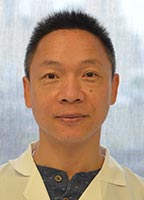
Kai Nie
Kai Nie is the program manager in Human Immune Monitoring Center (HIMC). He majored in Pharmacy in Peking University Medical Center in Beijing China, and then pursued graduate studies in Pharmacology at Georgetown University in Washington, DC. He is experienced in translational medical research in tumor study. Kai joined Human Immune Monitoring Center at the Icahn School of Medicine at Mount Sinai during the Covid-19 pandemic. Before working at the Icahn School of Medicine, he conducted research in leukocyte infiltration in CNS in response to viral infections at Lerner Research Institute of Cleveland Clinic, and Pediatric brain tumor in the Department of Pediatrics at Emory University. In HIMC, Kai manages study database, performs and plans assays for multiple clinical trials, prepares budget, and coordinates day-to-day lab operations. Kai aims to grow together with HIMC and contribute more to a higher standard.

Joo Young (Angela) Park
Joo Young (Angela) has a Master’s in Comparative Medicine from the University of Washington and a Bachelor’s in Microbiology, Immunology, and Molecular Genetics from UCLA, with a strong background in molecular biology, data analytics, and histopathology. She has extensive experience in both academia and industry. In addition to her research work in college and graduate school, Angela has worked in the industry at Psomagen Inc., a sequencing solutions company where she was responsible for technical benchwork and quality control of Sanger sequencing and NGS projects. Angela joined HIMC in September 2024. At HIMC, Angela focuses on streamlining immune profiling assays such as immune cell phenotyping using flow cytometry and optimizes sample processing and biobanking workflows for clinical trials, while leveraging her data-driven background to support immune response analysis. Angela is enthusiastic about contributing to advancements in precision immunology and translational research at HIMC.

Tia Rizakos
Tia Rizakos received her bachelor's degree in molecular biology and genetics at the University of Guelph in 2021. She earned her master's degree in molecular and cellular biology from the University of Guelph in 2023, with research focusing on the interactions between Pseudomonas aeruginosa and neutrophils in a Cystic fibrosis model, in the lab of Dr. Jennifer Geddes-McAlister. Tia joined HIMC in February of 2024, where she currently working on the sample management for clinical studies and performing proteomic and cytokine profiling as part of high-dimensional immune monitoring. Tia would like to delve deeper in cutting-edge immune assays for deeper understanding the role of immune system in human diseases and discovery of new biomarkers and treatment strategies.

Raina Roche
Raina Roche received her master’s degree in Clinical Neuroscience at King’s College London and her bachelor’s degree in Kinesiology at Rutgers University. During her graduate studies, she researched the use of neural stem cells and Dural ECM hydrogel as a novel therapy for traumatic brain injury. Raina joined the HIMC in September 2024, where she manages the Rarecyte Orion high-resolution multiplex imaging platform with the aim of visualizing and quantifying multiple molecular markers through one-shot staining of tissue section with multiple antibodies, to advance our understanding of landscape of immune cell infiltration and tissue microenvironment for various diseases. Raina is excited to develop a deeper understanding of immunology and pursue a career researching neuroinflammatory disorders.
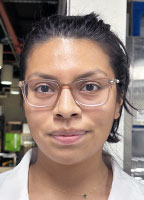
Natalie Samper
Natalie Samper received her Bachelor’s degree in Cell Biology and Neuroscience from Rutgers University. Following graduation, she worked in a basic science research laboratory, where her work focused on investigating the role of ATP-sensitive potassium (KATP) channels in both the cardiovascular and immune systems. Through this experience, she gained hands-on expertise in a variety of techniques, including molecular assays, data analysis, and in vivo and in vitro experimental models. Natalie joined HIMC in 2025 and work in clinical study biorepository and proteomics team. She is excited to further develop her research skills in a collaborative environment and is currently preparing to pursue graduate studies, with the goal of building a career at the interface of biomedical research and clinical impact.

Bryan Villagomez
Bryan Villagomez received his bachelor's degree in biology with minors in digital arts from SUNY Stony Brook University (SBU) in 2020. After graduating, he moved to Maryland and worked in the radiology department at the University of Maryland, Baltimore County (UMBC) as an animal research assistant. In September of 2021, he moved back to NYC and worked as a research technician at ContraFect Corporation, a microbiology biotech company located in Yonkers. Motivated by the development of human immunology and its contribution especially during the COVID pandemic, Bryan joined HIMC in December 2022. He is engaged in isolating immune cells and other components from blood or bone marrow samples for different clinical trials and conducting cytokine analysis using the cutting edge proteomic platforms such as Olink assay. Bryan is working towards graduate school and is utilizing the experience gained at HIMC to understand the human immune responses and biomarker discoveries for treatment of various human diseases such as cancer, IBD and autoimmune diseases.

Hui Xie
Hue Xie received her bachelor’s degree in biological engineering in China. Her undergraduate research focused on improvement of extraction process in industrial manufacture and environmental protection. She pursued her chemical engineering master’s degree at New York University. She joined the HIMC in 2015 and is responsible for the clinical trial and biomarker measurement.

Ruihua Zhang, PhD
Ruihua Zhang, PhD, received a doctoral degree in immunology and microbiology from the Tokyo Women’s Medical University of Japan in 2001. After graduating, Dr. Zhang undertook research and teaching in the Department of Immunology at Shanghai Medical College of Fudan University in China. Dr. Zhang went on to conduct research on immunological diseases at the Precision Immunology Institute at the Icahn School of Medicine at Mount Sinai. Dr. Zhang joined the Human Immune Monitoring Center at the Icahn School of Medicine at Mount Sinai in 2023 as an associate scientist, focusing on immune cell profiling through mass cytometry and spectral flow cytometry for clinical trials and studies. Dr. Zhang is excited to develop a deeper understanding of research techniques and of immune cell functions in cancer, inflammatory bowel disease, neurological disorders, growth hormone deficiencies, food allergies, autoimmune diseases, and other conditions.
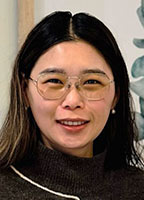
Chongfeng(Jasmine) Bi
Chongfeng (Jasmine) holds a Master’s degree in Bioinformatics from George Washington University, as well as both a Master’s and Bachelor’s degree in Clinical Medicine from Anhui Medical University. Jasmine has extensive experiences in performing comprehensive bioinformatics analyses across diverse datasets, including genomic, transcriptomic, and proteomic data. Her expertise lies in the integration and interpretation of complex biological data to uncover actionable insights. Since joining the Human Immune Monitoring Center (HIMC) in August 2024, Jasmine has played a key role in optimizing quality assurance and quality control (QA/QC) workflows for immune assay data across multiple platforms, including proteomics data from Olink Explore HT, Target assays, and Luminex assays. She is also proficient in cutting-edge sequencing data, including single-cell multi-omics, to support groundbreaking research initiatives. Driven by a passion for innovation, Jasmine is actively expanding her expertise in spatial technologies to uncover deeper biological insights and foster collaboration with clinical and translational research teams.

Darwin D'Souza
Darwin D'Souza earned his BSc in Biology in 2014 from the University of Western Ontario in London, Canada. To combine his passion for science and technology, Darwin went on to earn his MSc in Bioinformatics from the University of Leicester in 2015 in Leicester, UK. He was one of the first bioinformaticians hired at the Atlantic Cancer Research Institute in Moncton, Canada, where he was involved in the analysis of DNA-Seq and RNA-Seq data originating from exosomes and sequenced with the Ion-Torrent machine. He went on to work at The Center for Applied Genomics in Toronto, where he was involved in the development of production pipelines for WES and WGS data originating from Illumina sequencers. In his spare time, Darwin enjoys running, reading non-fiction, and watching the NBA.

Isha Parikh
Isha Parikh holds a Master's degree in Bioinformatics from Northeastern University and a Bachelor's in Biotechnology from D. Y. Patil University, India. She began her career in wet-lab research before transitioning to computational biology. Her professional experience includes working as a Data Analyst at Vasta Global, where she managed cancer datasets, and at the Dana-Farber Cancer Institute, where she focused on high-dimensional single-cell RNA sequencing (scRNA-seq) to study multiple myeloma. She currently serves as a Bioinformatician at the Human Immune Monitoring Center (HIMC), where she develops and optimizes workflows for single-cell, spatial, and multi-omics data to advance personalized medicine. Isha is dedicated to harnessing computational tools to transform complex data into actionable insights that enable more personalized and effective therapies.

Emir Radkevich
Emir Radkevich got his bachelors and masters degree in bioengineering and bioinformatics from the Moscow State University in 2021. During the last year of college and one year after graduation he worked in BostonGene as a bioinformatician working with bulk RNA-seq and WES data. Emir Radkevich joined the HIMC in 2022 as a computational scientist to deconvolute and analyze spatial and single-cell transcriptomics data for multiple clinical studies such as cancer immunotherapy, multiple myeloma, IBD, etc. Emir is keen on identifying gene signatures through immune profiling at single-cell resolution for various human diseases.